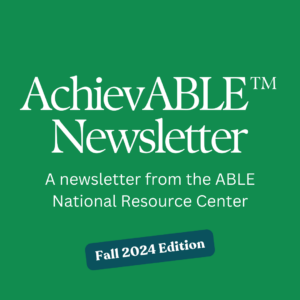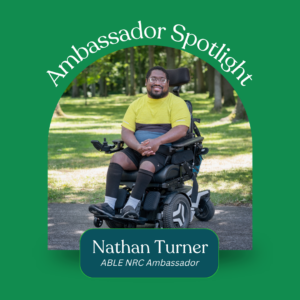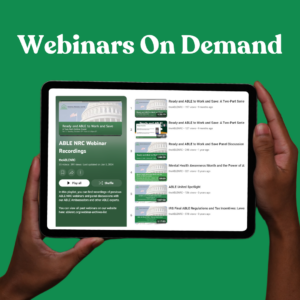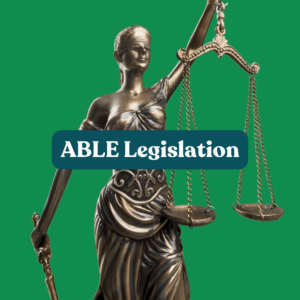
The Fall issue of our AchievABLE™ Newsletter contains stories on the following:
National disability employment awareness Month is near
During National Disability Employment Awareness Month (NDEAM), which takes place every October, the U.S. Department of Labor’s Office of Disability Employment Policy (ODEP) celebrates the value and talent workers with disabilities add to America’s workplaces and economy. NDEAM’s purpose is to confirm a commitment to ensuring workers with disabilities have access to good jobs every month of every year. That is the spirit behind this year’s theme, “Access to Good Jobs for All.” Employers, service providers and other supporters are encouraged to promote NDEAM.
The ABLE National Resource Center (ABLE NRC) is highlighting the importance of NDEAM by co-hosting an online seminar with the American Dream Employment Network (ADEN) on October 23rd from 2-3pm ET (Eastern Time). Register now to learn how combining an ABLE account with Social Security disability benefits or Supplemental Security Income (SSI), and participation in the Ticket to Work program, can lead to gainful employment outcomes for people with disabilities. This strategy also enables individuals to earn and save money towards achieving a goal now or in the future.
able ambassador spotlight
 Meet Nathan Turner! Nathan, an ABLE account owner since 2015, lives in Ohio and works full time helping adults living with disabilities navigate the Medicaid Waiver program. Outside of work, Nathan loves to travel, try new foods and connect with people. He enjoys new experiences and views his ABLE savings as a source of freedom.
Meet Nathan Turner! Nathan, an ABLE account owner since 2015, lives in Ohio and works full time helping adults living with disabilities navigate the Medicaid Waiver program. Outside of work, Nathan loves to travel, try new foods and connect with people. He enjoys new experiences and views his ABLE savings as a source of freedom.
In April 2024, during the webinar #ABLEtoSave for Lifelong Financial Wellness, Nathan emphasized the flexibility that ABLE accounts offer to employed account owners. He shared how his ABLE account allows him to earn a substantial income while still maintaining Medicaid eligibility. It also empowers him to make decisions about how he wants to spend his money.
Nathan also pointed out that, historically, there has been a lack of discussion about financial wellness among the people he supports, especially regarding basic financial wellness, saving or investing for the future. “ABLE is truly a lifeline for us,” he says, “to be able to live lives that are more similar to people who do not presently live with disabilities.”
aBLE NRC WEBINARS ON DEMAND
 Whether you are looking to deepen your understanding, or share valuable information with your community, the ABLE Account Basics Video is an excellent resource for self-study and presentations. This concise, 20-minute video covers the essential information about ABLE accounts, making it perfect for individuals new to the topic or those needing a refresher.
Whether you are looking to deepen your understanding, or share valuable information with your community, the ABLE Account Basics Video is an excellent resource for self-study and presentations. This concise, 20-minute video covers the essential information about ABLE accounts, making it perfect for individuals new to the topic or those needing a refresher.
In addition to this foundational video, the ABLE National Resource Center offers a comprehensive library of Webinars-on-Demand. These recorded sessions cover a wide range of topics related to ABLE accounts and are available 24/7 at your convenience. Whether you are a beneficiary, a person with a disability who does not receive a benefit from Social Security, a family member, an advocate or other supporter, these resources are tailored to meet your needs and help you to understand and to maximize the benefits of ABLE accounts.
ABLE QUESTIONS & ANSWERS
There were some recent changes involving HUD housing assistance programs that now limit resources and income. Is my ABLE account counted as a resource?
No, the HUD Housing Opportunity Through Modernization Act (HOTMA) excludes ABLE accounts from being counted as a resource (asset). Contributions deposited directly into an ABLE account from friends and family, a 529 qualified tuition plan or a trust are not countable income. ABLE investment growth is not countable income when spent on qualified disability expenses (QDEs). When ABLE funds are withdrawn to pay for QDEs they are not counted as income. These are significant advantages for ABLE account owners.
Can an ABLE account be used to fund self-employment aimed at improving my long-term independence?
Yes, an ABLE account can be used to fund self-employment. The expenses are qualified disability expenses (QDEs) if they help maintain or improve your health, independence or quality of life. In this example, funds could be used for business-related start-up expenses like purchasing equipment or to pay for ongoing expenses such as supplies, insurance, training, marketing or to purchase other tools necessary for the business. You should keep receipts and records detailing how the funds are used to validate that they align with the Internal Revenue Service’s definition of QDEs in the event of an audit.
Is an ABLE account a savings account, investment account or both? Do I have to save and invest?
No, it is your choice to save, invest, or do both with your ABLE account. Your decision will depend on your goals—whether they are short-term or long-term—how close you are to achieving them, your risk tolerance and your comfort level with investing. You can also rely on trusted family or friends for help. Some plans do not even offer an investment option. If you are unsure, you can start by using your ABLE account like a checking account and make changes as you gain more knowledge. If you set up your ABLE account like a regular FDIC-insured checking account, you will not lose money and you may still earn some money from your checking account, even though it may not offer optimal growth. Maintenance fees will be deducted like a regular bank account. If you receive Medicaid and are concerned about “claw back,” you can use your ABLE account like a standard checking account. If you are savvy with investing, or have someone to assist you, you can take some calculated risks and invest in options that are conservative, moderate or aggressive, depending on your needs, goals and risk tolerance.
Advancing aBLE
The ABLE National Resource Center is committed to building a better financial future for people with disabilities and their families. In the past AchievABLE™ newsletter, we shared two housing guides: Home Inheritance Guide for People with Disabilities and Achieving a Better Life Experience (ABLE) and Homeownership Guide for People with Disabilities. These publications include reliable information, case scenarios, tips and resource links that demonstrate an opportunity for people with disabilities to improve their financial situations through homeownership. The guides cover many of the basic homebuying concepts through a disability lens. They aim to dispel common myths around homeownership and home inheritance for people with disabilities and their families. The information is useful for individuals, families and professionals who serve people with disabilities.
On this note, Freddie Mac Multifamily announced the issuance of $186 million in Social Bonds aimed at supporting individuals with intellectual and developmental disabilities. The proceeds from these Social Bonds will be allocated to financial institutions that finance affordable housing or multifamily properties in underserved communities. The bonds will support 641 rental homes across 26 states, addressing the shortage of community homes for deinstitutionalized persons with disabilities. Of the combined 2,633 beds provided by these properties, over 2,000 will be affordable for very low-income individuals earning 50% or less of the area median income.
ABLE by the numbers
Quarterly ABLE (529A) data as of June 2024: There are 180,748 ABLE accounts opened nationwide with $2.032 billion managed in assets! Thank you to Paul Curley and ISS Market Intelligence for this data.
Federal legislation
 U.S. Senate. On June 13, 2024, U.S. Senators Bob Casey and Eric Schmitt introduced S.4541 the Ensuring Nationwide Access to a Better Life Experience (ENABLE) Act to extend three key provisions in the ABLE program set to expire in 2025. The ENABLE Act would make ABLE to Work, ABLE Saver’s Credit and the 529 college savings plan to ABLE rollover provision permanent!
U.S. Senate. On June 13, 2024, U.S. Senators Bob Casey and Eric Schmitt introduced S.4541 the Ensuring Nationwide Access to a Better Life Experience (ENABLE) Act to extend three key provisions in the ABLE program set to expire in 2025. The ENABLE Act would make ABLE to Work, ABLE Saver’s Credit and the 529 college savings plan to ABLE rollover provision permanent!
U.S. Senate. On August 1, 2024, Senator Casey introduced a package of three bills aimed at expanding ABLE access:
- S. 4909 ABLE Direct Deposit Act. This bill affirms that direct deposits from employers or government programs can be made to ABLE accounts.
- S. 4910 ABLE Awareness Act. This bill mandates that federal and state agencies inform eligible individuals about the ABLE program, its benefits and the steps to open an account. It aims to increase awareness and participation.
- S. 4911 ABLE Employment Flexibility Act. This bill allows employers to make employer contributions to an employee’s ABLE account in lieu of a 401(k) account so that employees with disabilities can save for retirement without contributions counting against access limits for federal benefits programs.
All three proposals were referred to the Senate Finance Committee.
stAte news
Florida ABLE United posted an ABLE Saving Calculator on their site, helping people to see how much they can save over time. Discover Your Savings Potential!
Illinois ABLE account owners will notice a lower Annual Account Maintenance Fee on their October quarterly statement. The Annual Account Maintenance Fee, which is assessed quarterly, has been reduced!
Kansas. ABLE accounts opened in Kansas by residents before December 31, 2024, will be eligible for a $100 ABLE empowerment grant. Although the grant was initially offered to individuals on the IDD (Intellectual and Developmental Disabilities) waitlist, on August 14, 2024, eligibility was expanded to all ABLE-eligible Kansans. Eligible individuals must apply and must attend one in-person or virtual ABLE educational event.
Fifth Third Bank, which collaborates with the National ABLE Alliance, to offer ABLE checking accounts, and Ascensus, which provides program management and support services for several ABLE programs across the nation, were in the news for their support of Project Search in Cincinnati, Ohio. Project Search aims to provide high school students with disabilities marketable and transferable skills. Fifth Third Madisonville hired two of the 10 interns who graduated from the program. Ascensus held a panel discussion which reviewed how employment helps ABLE account owners earn and save money.
